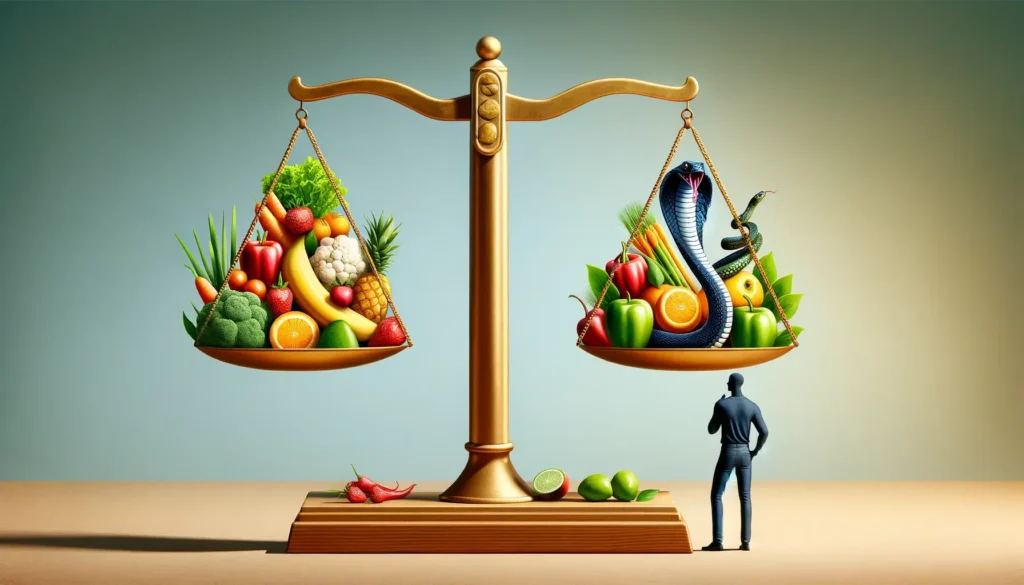You’ve tried chicken and pork; heck, you’ve even tried alligator, but have you ever considered eating a snake? It might not be as outlandish as you think. In many cultures, snake meat is a delicacy known for its unique texture and flavour. However, before you jump into this unusual culinary adventure, there are several factors you should consider. From health benefits and risks to ethical considerations, there’s more to snake consumption than meets the eye. Ready to explore this exotic food frontier? Let’s slither on.
Historical Context of Eating Snakes
While it might seem unusual today, humans have been consuming snakes for thousands of years, especially in societies where other protein sources were scarce or difficult to procure. This historical context is essential to understanding the complex relationship between humans and snakes.

You’re likely aware of the common concern: can snakes eat people? While it’s true that some snakes, like the reticulated python or the anaconda, can consume humans, such incidents are remarkably rare. In contrast, the question of whether people can eat snakes has a much more prevalent affirmative response.
Various communities worldwide, from Australia to Africa, have relied on snakes as a crucial part of their diet. They’ve developed sophisticated hunting techniques to capture and prepare these potentially dangerous creatures safely. This is not to advocate or encourage snake consumption but to acknowledge that survival has dictated a rather unconventional menu in certain circumstances.
Health Benefits and Risks
Turning to the topic of health benefits and risks, it’s important to understand that consuming snake meat, like any other type, has pros and cons.

High Protein Content: Snake meat is rich in lean protein, which is essential for building and repairing body tissues, and it’s less fatty than other types of meat. This can benefit your health if you want to maintain a balanced diet or lose weight.
Potential Toxin Exposure: you should also be aware of the potential risks. Some snakes are venomous, and while cooking usually neutralizes the venom, there’s always a chance of exposure. Also, snakes, like other wild animals, can carry parasites or disease-causing bacteria.
Allergenic Potential: Finally, anyone considering adding snakes to their diet should know the possibility of allergic reactions. People can be allergic to any food, and snake meat is no exception. Symptoms of food allergies can range from mild to severe, including anaphylaxis.
Preparing and Cooking Snake Meat
Now that you know the health implications let’s look at how to properly prepare and cook snake meat to ensure safety and maximize flavour. First, it’s critical to kill the snake humanely and immediately refrigerate the carcass to minimize bacterial growth.

When it comes to preparation, you’ll need to skin, gut, and wash the snake before cooking. Be careful when removing the skin, as venomous snakes can inject venom post-mortem. Use a sharp knife to make a slit from the head to tail along the belly, then peel back the skin, removing it entirely. Next, remove the internal organs and thoroughly wash the meat in cold water.
In terms of cooking, snake meat is quite versatile. It can be grilled, fried, or smoked and is often compared to chicken in terms of taste and texture. Grilling is a popular method, and it’s advisable to marinate the meat beforehand to tenderize it and enhance its flavour. Always ensure the meat is thoroughly cooked to eliminate any potential pathogens. Remember, every part of the process requires care and caution, but you can safely enjoy this exotic food with the right approach.
Ethical Considerations for Snake Consumption
Before delving into the culinary aspects of snake meat, it’s imperative to consider the ethical implications of consuming such an exotic creature. Snake consumption raises several ethical questions that you, as a responsible food consumer, should consider.

Sustainability: Is the snake species you plan to eat endangered or threatened? If so, consuming it may contribute to its extinction, which can disrupt ecosystems and biodiversity. Ensure you’re eating a snake classified as Least Concern on the IUCN Red List.
Animal Welfare: How is the snake killed? Methods that cause unnecessary suffering are ethically troubling. Look for information about humane harvesting practices and avoid meat from sources that can’t provide it.
Environmental Impact: Consider the ecological footprint of snake consumption. Transporting, storing, and cooking snake meat could have a higher environmental impact than other protein sources, contributing to climate change.
Cultural Beliefs and Practices
While weighing the ethical implications of snake consumption, it’s fascinating to explore the cultural beliefs and practices surrounding this unusual food source. In certain societies, snake consumption holds significant traditional and symbolic values. For instance, in parts of Asia, snakes are seen as a source of potent energy and their meat is believed to have healing properties.

It’s important to note that not all cultures share this perspective. In some Western societies, snakes are often viewed with fear or disgust, and eating them may be considered taboo. There’s also a religious aspect to consider. In certain faiths, snakes are considered sacred and killing them for food might be seen as sinful.
However, with globalization and the melding of cultures, snake consumption is not as clear-cut as it once was. While it’s still a controversial topic, it’s increasingly seen as a matter of personal choice rather than cultural dictate. But before you decide to try snake meat, it’s crucial to understand the cultural complexities and potential consequences. Ultimately, it’s about respecting diverse beliefs while exercising your right to choose.

